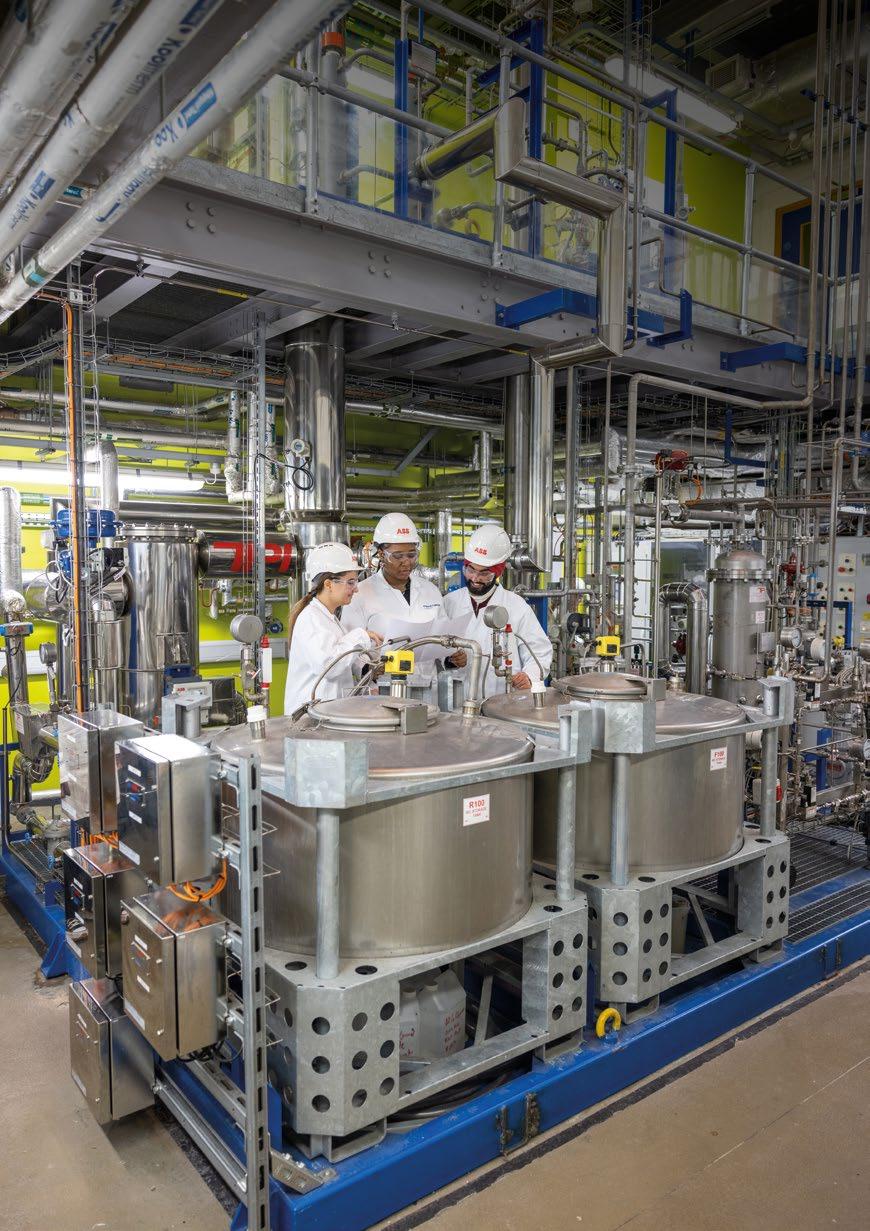
3 minute read
RESEARCH THEMES Sustainable Fuels
The development of sustainable fuels is critical to the long-term future of many hard-to-decarbonise sectors, notably the aviation, maritime and haulage industries, each a growing source of greenhouse gas emissions globally. While not a replacement for deep emissions reductions, some industries, like the steel and cement industries, will also require the use of carbon capture technologies, coupled with storage or utilisation options (CCUS), to decarbonise in line with climate targets. Our Sustainable Fuels theme covers a wide range of work in this area from the development of biofuels and hydrogen technologies to world-leading CCUS research and education. The College is home to the largest community of CCUS researchers in the UK and its carbon capture pilot plant, stretching over four floors at the heart of the Department of Chemical Engineering, is the only facility in the world where students can learn to operate a plant built to the highest industrial standards.

Advertisement
Centre for Synthetic Biology
Synthetic Biology is the underpinning discipline for advances in the UK bioeconomy, currently worth around £200bn. It is a technology base that is revolutionising methods of working in the biotechnology sector and represents a major opportunity for the UK economy. The Imperial College Centre for Synthetic Biology (ICCSynB) provides leadership and vision for synthetic biology at Imperial College, whilst developing an open, inclusive and collaborative environment for the best interdisciplinary research and ideas to flourish.
https://www.imperial.ac.uk/synthetic-biology/centre/
Clean Fossil and Bioenergy Research Group
Led by Professor Niall Mac Dowell, the Clean Fossil and Bioenergy Research Group is a diverse, world-class team leading research on the transition to a sustainable energy future. Understanding how we can transition to a low-carbon economy is a complex nexus of science, engineering, economics and policy. Drawing on science, engineering and economics, the group aims to deliver insight and understanding into how these aspects can work together to deliver the energy system of the future. https://www.imperial.ac.uk/a-z-research/clean-fossiland-bioenergy/
Minerals, Energy and Environmental Engineering (MERG) Research Group
Led by Energy Futures Lab Co-Director Professor https://www.imperial.ac.uk/people/a.korre
Anna Korre, the Minerals, Energy and Environmental Engineering (MERG) Research Group is a unique interdisciplinary team based in the Department of Earth Science and Engineering. It combines world-leading techniques in advanced measurement and multiscale, multi-physics modelling to develop engineering solutions for the supply of clean energy, the sustainable production of natural resources, and the mitigation of environmental impacts and risks.
Muggeridge group
Led by Professor Ann Muggeridge from the Department of Earth Science & Engineering, the Muggeridge Group investigates underground storage and flows of CO2, hydrogen, oil and gas. The group’s research interests include the influence of heterogeneities on flow in porous media; diffusion and dispersion in porous media; experimental studies of physics of flow in porous media and comparison with analytic/ numerical models; the movement of fluids on geological time-scales in the sub-surface; and storage of carbon dioxide in subsurface reservoirs.
https://www.imperial.ac.uk/people/a.muggeridge
Solar Coatings Group
Led by Dr Andreas Kafizas in the Department of Chemistry, the Solar Coatings Group is developing light-activated coatings that can drive useful chemistry using sunlight, with applications in renewable fuels production (hydrogen fuel from water and carbon-based fuels from CO2), air remediation (NOx removal) and water remediation (arsenic removal). For these coatings to be commercially viable and sustainable, they are produced using low-cost, earth abundant, non-toxic materials. The group is also interested in developing new lightactivated materials to improve the function of these coatings.
https://www.imperial.ac.uk/people/a.kafizas
Carbon capture pilot plant
Stretching over four floors, the carbon capture pilot plant is at the centre of the Chemical Engineering Department, providing a fully hands-on discovery experience for students and researchers alike. The only facility in the world where undergraduate students are able to learn to operate such a plant, it attracts students and summer school cohorts from across the globe.
Built to the highest industrial standards, the plant is a core part of the training we provide to all of our young chemical engineers, typifying many of the features that graduates will encounter in the ‘real world’, and giving them skills that will be essential in their future careers.
Our futuristic carbon capture pilot plant is also a vital resource in the fight against climate change, demonstrating best practice in capturing and storing harmful carbon dioxide before it can be released into the atmosphere. We encourage leading industrial organisations to use our facility for research purposes, with the hope that one day the technology will be adopted on a much larger scale.












